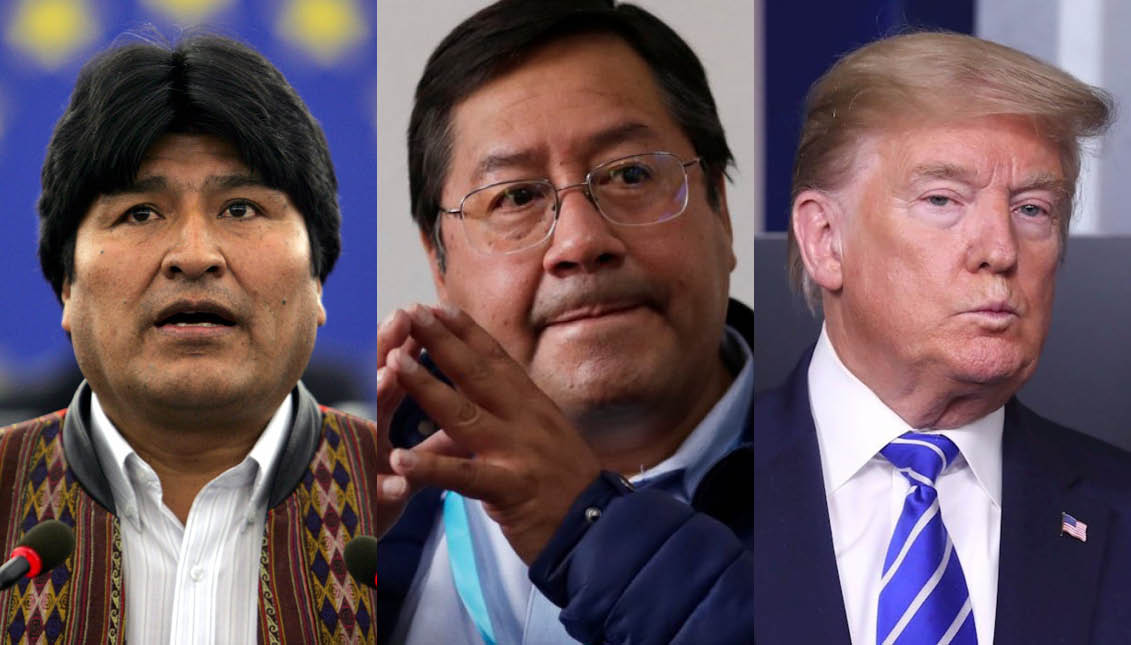
Bolivia is still living through the aftermath of its 2019 coup
Evidence shows Trump’s DOJ supported the ousting of Bolivian President Evo Morales after the 2019 elections.
New Bolivian president Luis Arce inherited a country battling several crises when he took over in November of last year after winning in a landslide election.
The obstacle he has to overcome directly relates to why he ran for Bolivia’s highest office in the first place.
Arce served as the Minister of Economy and Public Finance for much of the presidency of populist leader Evo Morales.
Upon seeking a fourth term of power, Morales received accusations of dictatorial nature from conservative politicians, which were almost politically irrelevant in the Legislative Assembly compared to the Movement for Socialism (MAS) party.
He assumed the leadership of MAS in 1998 after gaining notoriety for his defense of coca leaf farming, and winning a seat in Bolivia’s Chamber of Deputies.
Morales became his country’s first indigenous president in 2006 following successful anti-government protests, which he led, that saw masses come out against government efforts to privatize natural resources like gas and water in the underdeveloped, landlocked country.
The Socialist president used less than convincing arguments to run for a third and fourth term.
Bolivia allows its leaders to run for a limit of two terms, but in 2014, he argued that since there was a constitutional reform in 2009, he was entitled to a second term under the new constitution.
Supporters of Morales were able to bypass this because under his policies, a fifth of the country was lifted out of poverty, and the constitution allowed government and society to be more inclusive of indigenous people. About two-thirds of the country pertains to one of the region’s indigenous tribes.
Over the course of his advocacy, the more vocal the populist leader became the more he angered powerful members of the international community, particularly the U.S.
When Morales helped unionize coca leaf workers in the 1980s he was also going against the American policy of coca eradication, which was a response to the “War on Drugs” and intended to stop the flow of cocaine — processed coca — from entering the country.
He knew that coca farming was a significant part of the economy for indigenous people and U.S. enforcement of coca eradication led to a severe financial crisis in 1985.
In leading anti-government protests against efforts to privatize natural resources during the Bolivian Gas Conflict (2003 - 2005) he clashed with American interest again. Privatizing Bolivian gas allowed it to be sold to the U.S. below the market value through neighboring Chile.
Morales’ electoral victory was a welcomed addition to the “pink tide” Latin America was experiencing at the time.
The pink tide is used to mark the turn towards leftists governments that many Latin American countries took at the beginning of the 21st century. Bolivia allied with Rafael Correa in Ecuador, Cristina Fernández de Kirchner in Argentina, Hugo Chavez in Venezuela, among others throughout the years.
The commonalities among pink tide countries is that they had all experienced conflict because of a U.S.-backed, right-wing dictator. Some of these leftists leaders took to international forums to denounce actions of the U.S. in foreign matters.
When Venezuela’s Chavez addressed the United Nations General Assembly in 2006, he referred to president George W. Bush as “the devil” and said that the podium still smelled like sulfur he had recited the day before.
Morales declared Israel, a strategic and strong U.S. ally in the Middle East, a “terrorists state” in 2014 because of ongoing offensives it launched in the Gaza Strip against Palestinian civilians.
He also expelled the Drug Enforcement Administration (DEA) from Bolivia in 2008 because of suspicions it was being used to undermine his government.
During his time as president, Morales would also continuously reject loans from the International Monetary and the World Bank, which are both headquartered in Washington D.C., because he wanted to avoid institutions imposing neoliberal policies on his regime.
At a U.N. Security Council meeting in 2018, the socialist leader used part of his time to criticize the Trump administration and U.S. imperialism.
“Each time that the United States invades nations, launches missiles or finances regime change, it does so behind a propaganda campaign which incessantly repeats the message that it is acting in the cause of justice, freedom and democracy… in no way is the United States interested in upholding democracy,” said Morales.
Leading up to the 2019 election, in 2016, Morales tried to pass an amendment that would lift term limits for presidents, but after it failed, he got his wish through the Plurinational Constitutional Tribunal.
The Organization of American States (OAS), a hemispheric cooperation based in Washington D.C., was then worried Bolivia could become the next Venezuela, but after Secretary-General Luis Almagro visited the Andean country and took photos with Morales, their confidence in the election was restored.
The Oct. 20 elections of that year were close, but many still expected Morales to win. In Bolivia, if no candidate obtains a majority of the vote or leads by 10% or more via a plurality, then a second round is held.
On election night, an unofficial tally showed the MAS candidate leading Carlos Mesa by 7.9 points and the final count showed him winning by 10.6%, barely avoiding a runoff.
Supporters of the opposition suspected fraud took place and took to the streets to demonstrate.
The OAS came out with a statement the day after the election.
“The OAS Mission expresses its deep concern and surprise at the drastic and hard-to-explain change in the trend of the preliminary results revealed after the closing of the polls,” read part of the statement.
The late increase in votes for Morales does have an explanation.
When voters saw the early count, only 83% of the vote had been tallied and many of the remaining ballots were coming from rural areas, where MAS dominates in support.
It’s similar to the 2020 U.S. presidential election, where some Republicans questioned how Joe Biden won Georgia and Pennsylvania later in the race, but most of the remaining votes were coming from Democratic strongholds like Atlanta and Philadelphia.
This gave more fuel to arguments of electoral tampering by MAS. The OAS eventually released a preliminary report on the electoral process less than a week after the protests had started.
Morales offered to hold new elections on Nov. 10, but it was too late for the opposition and he was asked to step down by the military.
He then became a political exile in Mexico. After old ally, Kirchner, became vice president of Argentina, he sought refuge there to be closer to home.
RELATED CONTENT
Jeanine Añez became interim president and her de-facto government enacted various human rights violations, like restricting free speech and ordering state forces to fire at non-violent indigenous protesters.
People formed roadblocks across the major cities in Bolivia to protest the government's poor response to the coronavirus. They also delayed elections twice because of the pandemic.
In December, the OAS released a more indepth and detailed report on the 2019 Bolivian election.
Dr. Tulia Falleti, the Director of the Latin American and Latinx Studies program at the University of Pennsylvania, told AL DÍA News last year why that report is not reputable.
“When the OAS electoral analyst entered the timestamp instead of putting it in the 24:00 hour format, and seeing how the votes were arriving throughout the day, he left the AM and PM format of the data. Then everything got mixed up because after 1:00 a.m., you saw 1:00 p.m. and after 1:01 a.m., came 1:01 p.m. That error completely invalidated the statistical analysis," she said.
In Feb. 2020, the organization launched scathing criticisms towards two researchers from the Massachusetts Institute of Technology (M.I.T.) for conducting an independent analysis.
John Curiel and Jack R. Williams were commissioned by the Center for Economic and Policy Research to look into the electoral mayhem in the South American country.
Their work titled, “Analysis of the 2019 Bolivia Election,” which labeled the OAS report as flawed, was eventually published by the Washington Post.
“It defies all logic that individuals that hold themselves out as ‘scientists’ and ‘specialists in election integrity’ would engage in such flawed analysis,” wrote an O.A.S. official, in a letter to The Post.
Morales was still leading MAS from his exile in Argentina and selected his former cabinet member, Arce, to run in the elections scheduled for Oct. 18, 2020.
Añez dropped out of the race a month before the elections. Polls showed her having either the third or fourth highest share of support.
The former minister obtained more than 55% of the vote and was 30 points ahead of second place Mesa.
Through emails obtained by The Intercept it found that the M.I.T. researchers had been contacted by the Department of Justice three days before the election.
“Trial attorney Angela George identified herself as an attorney at the Justice Department’s Office of International Affairs, or OIA, and said she had ‘received a formal request from Paraguay’ for assistance in an ongoing criminal investigation. Curiel told her she had the wrong researcher, as he had not worked on any Paraguayan election study, and she told him that Bolivia was the one she had meant,” The Intercept wrote.
George was persistent and wanted to speak with both academics before Nov. 6 about their work. Once Williams explained that a call would not be necessary since they were going off of publicly available information, the trial attorney threatened to order a subpoena against them.
The move to subpoena the researchers was extreme since the Department of Justice has strict protocols that favor freedom of the press.
U.S. government-funded media organization Voz de América, the Spanish-language complement to Voice of America also came out against the M.I.T. researchers and named them in an article published in March of last year.
The article takes the position of the de-facto government in Bolivia and higher ups at the OAS.
“Bolivia roundly rejected the supposed study from the Massachusetts Institute of Technology (MIT, by its English initials), which assured that there had been no electoral fraud in Bolivia,” the article by Yuvinka Gozalvez Avilés began.
It adds more evidence to the claim that the Trump administration not only supported the ousting of Morales in 2019, but actively tried to impede Arce from bringing socialism back to Bolivia.
“The resignation yesterday of Bolivian President Evo Morales is a significant moment for democracy in the Western Hemisphere. After nearly 14 years and his recent attempt to override the Bolivian constitution and the will of the people, Morales’s departure preserves democracy and paves the way for the Bolivian people to have their voices heard,” a statement from Trump on the 2019 election read.











LEAVE A COMMENT: